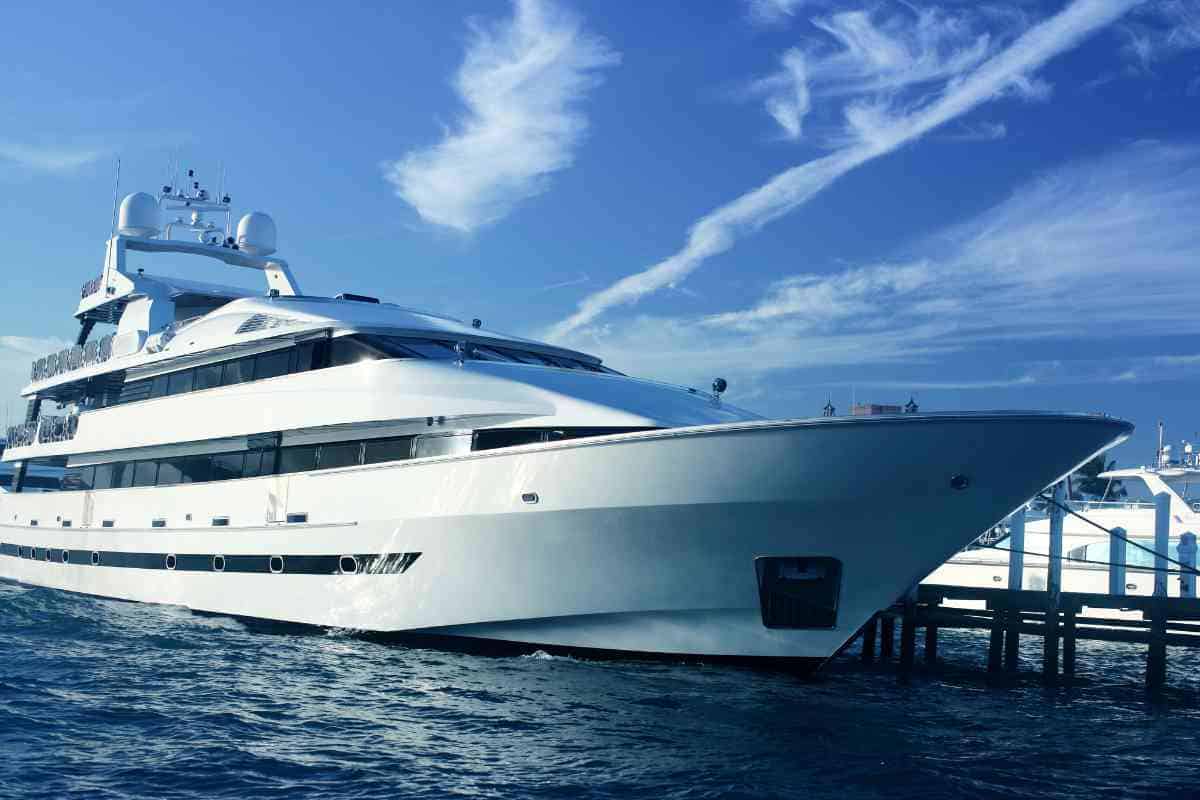How Much Does a Yacht Salesman Make: A Comprehensive Guide
In the luxurious world of yachts, the role of a yacht salesman is both essential and intriguing. Serving as the crucial link between eager buyers and sellers, they wield the power to make or break a deal. Their responsibilities extend beyond mere transactions, encompassing a deep understanding of the market, excellent negotiation skills, and a keen eye for detail. This comprehensive guide provides an in-depth look into the multifaceted role of yacht salesmen, breaking down their job responsibilities, income structure, the importance of geographical location in their salary, and introducing you to the key players in the industry.

How much do yacht salesmen make?
Yacht salesmen’s earnings primarily hinge on commissions, which can vary based on the yacht’s value and age. On average, in the U.S., a yacht broker’s base salary is around $100,870 annually. However, actual earnings can fluctuate based on factors like yacht type, location, and individual expertise.
Read on to uncover the educational and skill requirements for aspiring yacht salesmen, comprehend the intricacies of their salary structures, and get acquainted with the top dealership firms that dominate the U.S. market. This guide will arm you with valuable insights, whether you’re an aspiring yacht salesman, a curious enthusiast, or someone considering a purchase in the near future.
Role and Responsibilities
A yacht salesman acts as the bridge between yacht buyers and sellers, playing a pivotal role in the purchasing process. Here’s a breakdown of what the job entails:
- For Buyers
- Understand their yacht preferences, needs, and budget.
- Offer insights on different yacht types, features, and pricing.
- Arrange viewings and sea trials.
- Guide through the purchasing intricacies.
- For Sellers
- Assist in yacht pricing based on market trends.
- Develop engaging listings with quality photographs and descriptions.
- Market the yacht to potential buyers.
- Lead negotiations and guide the selling process.
Income Structure

Yacht salesmen typically have an income based on commissions, which are percentages from the sales they broker:
- New Yachts: Commissions usually range between 5-10% of the sale price.
- Used Yachts: Commissions can be around 2.5-7.5% of the sale price.
In certain cases, brokerage firms provide a base salary to yacht salesmen, though many work solely on commission.
Salary Overview
On average, a yacht broker in the U.S earns a base salary of $100,870 annually. However, this figure can deviate based on factors like:
- The yacht’s size and type.
- The company’s commission structure.
- Individual experience and expertise.
Key Skills for Success
To excel as a yacht salesman:
- Possess strong communication and negotiation abilities.
- Deeply understand the yacht industry.
- Forge lasting relationships with clients.
- Exhibit a robust work ethic and meticulous attention to detail.
Guide to Becoming a Yacht Salesman: Education and Essential Skills
Becoming an adept yacht salesman entails both formal education and the honing of several key skills. Let’s break down the educational prerequisites and the skills paramount to success in the industry.
Educational Requirements
| Education Level | Description |
| High School Diploma | A basic requirement; having retail sales experience can further bolster opportunities in the yacht sales arena. |
| Bachelor’s Degree | While not always mandated, many employers prefer candidates with degrees. According to the Bureau of Labor Statistics, yacht brokers often have a degree, especially in sales and marketing. |
| Retail Marketing and Sales Classes | For those without a formal degree, these classes can be invaluable, providing foundational knowledge and skills in the sales domain. |
| Certifications | While not always necessary, obtaining certifications related to yacht sales or maritime activities can give an edge in the industry. |
Essential Skills for a Yacht Salesman
| Skill | Description |
| Sales Skills | Vital for persuading potential buyers about the merits of yacht ownership. |
| Negotiation Skills | Crucial for finalizing deals and ensuring both buyer and seller satisfaction. |
| Customer Service Skills | Establish and maintain strong client relationships, providing post-sale support and addressing any concerns. |
| Technical Knowledge | Understand the intricate details of different yachts, their features, and operational specifics. |
| Marketing Skills | Craft compelling marketing materials and leverage various channels to reach potential buyers effectively. |
While the foundation for a yacht salesman’s career can begin with the right education, the mastery of the industry hinges on the development of these key skills. Aspiring salespeople should focus on cultivating these attributes to ensure long-term success and client satisfaction.
Yacht Salesman Salary: An In-depth Overview

Becoming a yacht salesman can be a lucrative career choice for those with the right skillset and passion. However, the potential income varies based on several factors. Here’s a comprehensive look at what a yacht salesman can expect in terms of salary.
Base Salary
- Salary.com: The average base salary for a yacht salesman in the U.S. is $50,877 annually. This can range between $39,790 to $66,588.
- ZipRecruiter: The average salary for a yacht salesman is $48,589 per year in the U.S. However, salaries can be as low as $20,500 or reach up to $59,499. The top 30% of yacht salesmen earn over $53,000 annually.
Commission Structure
A significant portion of a yacht salesman’s earnings comes from commissions. Typically:
- Yacht brokers might get a minimal base salary, supplemented by commissions from completed sales.
- Commissions can be a flat amount or a percentage of the yacht’s sale price, with 10% being a common rate.
- Some yacht brokers operate solely on commission, without any base salary.
Location-based Variations
The region you work in can play a pivotal role in determining salary:
- Yacht salesmen in Massachusetts earn an average of 14.6% more than the national average.
- In Nevada, they earn roughly 16.5% more than the national average.
Decoding the Commission Structure for Yacht Salesmen
A significant factor in a yacht salesman’s earnings is the commission they receive from sales. Delving into the commission structure is key to forecasting your potential income in this profession.
What is Commission?
Commission refers to the compensation a salesperson receives per sale. Within the yacht industry, it’s customarily a percentage of the yacht’s selling price. The rate is influenced by the brokerage firm and the yacht’s size.
Differentiating Between Net Commission and Percentage Commission:
- Net Commission: This is the commission amount left after the brokerage firm deducts its share.
- For instance, on a $1,000,000 yacht sale, if the firm’s cut is 20%, your net commission becomes $160,000 (20% of $800,000).
- Percentage Commission: This is your commission as a proportion of the yacht’s selling price.
- In the example above, your percentage commission stands at 16% (which is $160,000 of $1,000,000).
Understanding Split Commission:
At times, the commission is divided between the representatives of the buyer and the seller.
- Customarily, the distribution is 60/40. Here, the buyer’s agent gets 60%, and the seller’s representative receives 40%.
- In unique scenarios, like when a broker represents both buyer and seller, it could be an even 50/50 split.

Breakdown of Commission Structures in Yacht Sales:
| Commission Structure | Explanation |
| Base Rate Only | Salespeople earn a set hourly wage or flat salary devoid of any commission. This is prevalent when sales agents spend extensive periods guiding customers pre and post-sales. |
| Percentage Commission | Sales agents get a slice of the yacht’s selling price. A typical rate in yachting is around 10%. |
| Net Commission | After the brokerage firm’s deduction, sales agents receive a commission. This is generally a fraction of the selling price. |
| Split Commission | Commission is divided between the agents of both the buyer and the seller. It often stands at a 60/40 distribution, favoring the buyer’s representative. |
Comprehending the commission structure is paramount for yacht salesmen. Your earning potential hinges largely on the kind of commission structure in place and the specific rates set by the brokerage firm, as well as the value of the vessels you’re dealing with.
The Role of Geography in Yacht Sales Salaries
Geography plays a crucial role in determining the salary scales for various professions, and yacht sales is no exception. Numerous elements like the economic environment, yacht demand, and living costs converge to dictate the pay scale across different regions.
United States Yacht Sales Salary Spectrum:
In the U.S., the pay scale for yacht sales professionals ranges between $39,790 to $66,588 annually, as reported by Salary.com. Nevertheless, these figures can oscillate depending on the specific state or city, influenced by varying regional conditions.
Cities Offering Prime Salaries:
Some urban areas, typically those with a more significant demand for yachts or higher living costs, naturally tender superior salaries for yacht sales roles. A survey by ZipRecruiter indicates:
- Washington, D.C. – Commanding an average annual salary of $66,360.
- San Francisco, California – Averaging a yearly income of $65,151.
- Jackson, Wyoming – Standing at a mean yearly wage of $64,717.
- Stamford, Connecticut – Yielding an average of $63,202 each year.
- Little Rock, Arkansas – Providing an average yearly pay of $62,541.
- Wichita, Kansas – Offering around $61,820 annually.
Cost of Living Influence:
The living cost acts as a paramount influencer in setting the pay scale. For instance, a higher living cost in San Francisco, when juxtaposed with Little Rock, often necessitates a loftier salary in the former. Prospective yacht sales agents must diligently weigh the offered salary against the living costs to discern the financial viability of a position.
Navigating the Waters of Yacht Sales: Key Players in the Industry
In the vast and luxurious realm of yacht sales, there are specific organizations and brands that are particularly esteemed. Let’s delve into a comprehensive understanding of these key players in the yacht sales industry.
Dealership Firms: Your Gateway to the Yacht World

Dealerships typically deal with the sale of new yachts, providing a diverse range of options for potential buyers and serving as an excellent entry point for those aspiring to make a career in yacht sales.
Leading Dealership Firms in the U.S.:
- MarineMax
- Headquarters: Clearwater, FL
- Galati Yachts
- Headquarters: Anna Maria, FL
- HMY Yachts
- Headquarters: Palm Beach Gardens, FL
- Marine Concepts
- Headquarters: Cape Coral, FL
Brokerage Enterprises: Specialists in Resale
Brokers have a niche focus on the resale market of yachts. They act as the bridge connecting buyers and sellers, ensuring a smooth transaction process for pre-owned yachts.
Forefront Brokerage Firms in the U.S.:
- Denison Yachting
- Headquarters: Fort Lauderdale, FL
- Northrop & Johnson
- Headquarters: Fort Lauderdale, FL
- Worth Avenue Yachts
- Headquarters: Palm Beach, FL
- Ocean Independence
- Headquarters: Fort Lauderdale, FL
Pioneering Brands: The Titans of Yacht Manufacturing
Several brands have etched their mark in the yacht industry by consistently delivering unparalleled quality, design, and luxury. These brands, while having dedicated sales teams, often collaborate with both dealership and brokerage companies.
Industry’s Leading Yacht Brands:
- Azimut
- Ferretti
- Sunseeker
- Princess
- Benetti
- Lurssen
- Feadship
The yacht sales industry is teeming with possibilities, courtesy of its varied and esteemed players. From dealerships that offer new, gleaming yachts to brokers that cater to the resale market, to the eminent brands that dictate luxury on the seas – there’s a multitude of avenues for yacht sales enthusiasts to embark on. Whatever your inclination, be it joining a dealership, a brokerage, or representing a luxury brand, the horizon is vast and full of potential.
Legal and Insurance Aspects in Yacht Sales: A Deep Dive
In the world of yacht sales, a comprehensive understanding of the legal and insurance intricacies is paramount. Yacht sales involve substantial financial transactions and potential liabilities, so every yacht salesman must be well-acquainted with the legal and insurance aspects to ensure seamless and protected deals. Let’s delve into these in detail:
Contracts in Yacht Sales:
Contracts are the backbone of yacht sales, solidifying the terms, conditions, and protections for all parties involved.
| Type of Contract | Description |
| Purchase Agreements | Outlines the terms under which a buyer agrees to purchase the yacht. |
| Sales Contracts | Establishes the conditions, price, and terms of the yacht sale. |
| Listing Agreements | Defines the relationship between the yacht owner and the selling broker, including commission rates and listing duration. |
Key Point: Always engage legal professionals to ensure the enforceability and legal soundness of all contracts.
The Art of Negotiations:

As the intermediary between the buyer and seller, yacht salesmen often find themselves in the midst of negotiations.
Key Point: Always prioritize the client’s best interests, be prepared to compromise, and strive for win-win outcomes for both parties.
Navigating the Legal Seas:
Being cognizant of the legal implications ensures smooth sailing in yacht sales.
| Legal Aspect | Description |
| Maritime Law | Deals with matters including marine trade, marine navigation, and marine salvaging. |
| Tax Law | Focuses on the taxation structure relevant to the sale and purchase of yachts. |
| Environmental Regulations | Ensures that yachts adhere to environmental standards. |
Key Point: Always be proactive in identifying potential legal impediments like liens and title issues, and resolving them prior to sale completion.
Safeguarding with Insurance:
Insurance policies play a pivotal role in ensuring both the buyer’s and seller’s interests are protected in yacht transactions.
| Type of Insurance | Description |
| Liability Insurance | Covers legal responsibilities for injuries or damages to another party. |
| Hull Insurance | Provides protection against physical damage to the yacht. |
| Charter Insurance | Specifically designed for chartered yachts, covering liabilities during charter periods. |
Key Point: Always ensure that insurance policies are up-to-date, compliant with requirements, and sufficiently cover the interests of both parties involved.
Industry Trends and Economic Advancement in Yacht Sales
Embarking on a career in yacht sales? The dynamic world of luxury vessels is affected by an intricate web of industry trends and economic advancements. Here’s a structured breakdown to understand the interplay of these factors:
Industry Pulse:
Yacht sales do not exist in a vacuum. They are affected by wider industry trends which can give you valuable insights into future potential.
a. Growth Forecast:
- Metric: Compound Annual Growth Rate (CAGR) of the global yacht market.
- Forecast: Expected to grow at 5.8% from 2023 to 2030.
- Drivers: Rising disposable income, burgeoning interest in recreational activities, and heightened demand for luxury products.
b. The Post-Pandemic Surge:
- Statistic: A 13-year peak in sales of boats, marine products, and services in 2020, a 9% rise from the previous year.
- Implication: The yachting industry is poised to ride the wave of the post-pandemic resurgence as people increasingly gravitate towards open-air activities and vacations that inherently provide social distancing.
Economic Undercurrents:

The broader economy significantly influences yacht sales. Understanding its pulse can offer predictive insights into sales trends.
- Upshot of Rising Interest Rates: Potential curtailment of yacht sales due to pricier buyer financing.
- Economic Expansion Benefits: Renewed investments in yachting infrastructure, like marinas, can galvanize sales. A prospering economy can enhance disposable incomes, directly translating to luxury sales.
The yacht sales universe is often a reflection of larger economic patterns and investment trajectories.
- Trend: A prospering real estate market in a region can often herald a spike in luxury expenditures, including yachts.
- Pattern: Trade rifts, political tensions, or shifts in global trade paths can reshape the yacht demand landscape.
- Example: Diplomatic strains between countries, leading to economic sluggishness, can dampen the yacht fervor in those territories.
Yacht Construction and Performance: An Overview
In the realm of yacht sales, diving into the intricacies of construction and performance is instrumental. It’s not just about selling a vessel—it’s about understanding its very essence. The core elements and how they intertwine to create a luxurious, high-performance yacht is crucial for any sales pitch or purchase evaluation.
Yacht Construction:
The core materials and design philosophy play a pivotal role in the yacht’s final form and functionality.
Materials:
- Fiberglass:
- Pros: Cost-effective and easy to maintain.
- Best for: Smaller yachts.
- Aluminum:
- Pros: Robust and durable.
- Best for: Larger yachts.
- Steel:
- Pros: Extremely strong and reliable.
- Best for: Large, ocean-going yachts.
Design & Engineering:
A well-thought-out design ensures optimum space utilization, aesthetics, and comfort. Proper engineering, on the other hand, ensures smooth sailing.
- Layout & Amenities: Can dictate luxury levels and usability.
- Propulsion & Electrical Systems: Critical for operations, energy efficiency, and environmental impact.
Other Considerations:
- Maintenance Needs: Can influence long-term costs and yacht durability.
- Age & Condition: Directly impacts resale value and reliability.
Performance Aspects:
How a yacht moves and behaves in the water is as critical as its construction.
Hull Shape:
- Deep-V Hull:
- Advantage: Superior performance in rough seas.
- Best for: Offshore cruising.
- Planing Hull:
- Advantage: Offers high-speed cruising in relatively calm waters.
Weight and Distribution:
Ensures stability, especially in choppy waters. Mismanaged weight can lead to inefficiencies and potential safety risks.
c. Critical Metrics:
- Speed: Dictates travel time and can influence fuel efficiency.
- Fuel Efficiency: Important for long cruises and environmental considerations.
d. Handling:
It’s not just about speed, but how the yacht maneuvers, especially in varying sea conditions.

Table Summary:
| Construction Considerations | Performance Considerations |
| Materials (fiberglass, aluminum, steel) | Hull shape (deep-V, planing) |
| Design (layout, amenities) | Weight distribution |
| Engineering (propulsion, electrical systems) | Speed |
| Maintenance requirements | Fuel efficiency |
| Age and condition | Handling in different sea conditions |
Selling or purchasing a yacht goes beyond its aesthetic appeal. A deep dive into the yacht’s DNA—its construction, materials, design philosophy, and performance characteristics—ensures that the vessel not only meets but exceeds expectations. Whether it’s a serene cruise or an adventurous voyage, understanding these facets is the cornerstone of an informed decision.
Licensing and Certification in Yacht Sales: A Guide
Embarking on a journey as a yacht salesman is not just about understanding vessels, but also ensuring you’re equipped with the right credentials to conduct business. Licenses and certifications not only help you abide by the law but also enhance your credibility in the market.
Licenses
Yacht Broker’s License:
- Purpose: Permits individuals to broker yacht sales.
- Requirements:
- Passing a state-administered exam, which encompasses yacht sales contracts, escrow management, and legal mandates linked to yacht sales.
Salesperson License:
- Purpose: Legally sanctions the selling of yachts under a licensed yacht brokerage.
- Requirements:
- It varies from state to state, but usually, you have to complete an application and demonstrate employment or affiliation with a licensed brokerage.
Certifications:
Certifications, while not mandatory, bolster your market standing by showcasing your dedication and expertise.
Certified Professional Yacht Broker (CPYB):
- Purpose: Demonstrates advanced knowledge and professionalism in yacht sales.
- Requirements:
- Minimum three years in yacht sales and brokerage.
- Clear a detailed examination.
International Yacht Brokers Association (IYBA) Certified Yacht Broker:
- Purpose: Validates understanding of international yacht brokerage standards and practices.
- Requirements:
- Finish a series of online courses.
- Successfully pass an examination.
Summary Table:
| License/Certification | Requirements |
| Yacht Broker’s License | Pass a state-administered exam |
| Salesperson License | Required in specific states |
| CPYB Certification | At least three years of experience & passing an exam |
| IYBA Certified Yacht Broker | Completion of online courses & successful examination |
The Charter and Travel Dimension in Yacht Sales: A Deep Dive

In the exciting world of yacht sales, selling the dream of yachting can sometimes mean more than just selling the yacht itself. For those clients who wish to embrace the luxury of yacht travel without the obligations of ownership, chartering becomes a tantalizing option. As a yacht salesman, broadening your understanding of the charter and travel sectors can unlock new avenues for revenue.
Types of Charters:
Understanding the different chartering options is pivotal for addressing varied client needs:
a. Bareboat Charters:
- Description: This provides clients with the yacht alone, sans crew. Clients take charge of navigation and operations or hire crew externally.
b. Crewed Charters:
- Description: These come with an in-built crew to manage the yacht and offer services, from piloting to gourmet meals.
c. Day Charters:
- Description: Short-term rentals for specific activities or day trips, like diving, fishing, or sightseeing.
Popular Yacht Travel Destinations:
Knowing the hottest yacht destinations can be a game-changer when proposing travel packages:
The Caribbean:
- Highlights: Crystal clear waters, white sand beaches, and diverse marine life.
The Mediterranean:
- Highlights: A blend of history and luxury with destinations like the romantic coastlines of Italy or the iconic islands of Greece.
Alaska:
- Highlights: A bold choice offering an untouched wilderness, mesmerizing glaciers, and unique wildlife viewing opportunities.
Transparent Cost Breakdown:
Clients appreciate clarity. When selling charters and packages, providing a clear breakdown of potential costs can foster trust:
| Expense Category | Potential Costs |
| Charter/Package Base | Cost of the yacht charter or package itself. |
| Fuel | Varies by distance, yacht size, and fuel rates. |
| Food & Beverages | Depending on client’s preferences & yacht size. |
| Additional Activities | Snorkeling, diving, guided tours, etc. |
Conclusion
Being a yacht salesman is more than just selling luxury boats—it’s about understanding the nuances of a niche market, building strong relationships, and ensuring both buyer and seller satisfaction. While formal education lays the groundwork, the true mastery of the profession hinges on continuous learning, adaptability, and honing essential skills. As the world of yachting continues to evolve, so too will the role of the yacht salesman, making it an exciting and rewarding career path for those passionate about the maritime world.
Frequently Asked Questions
What is the average salary for a yacht salesman in Florida?
According to GoDownsize, the base salary for a yacht salesman is typically between $15,000-$30,000. However, the salary can vary depending on the location, experience, and size of the yacht. In Florida, the average salary for a yacht salesman is around $50,000 per year. Keep in mind that this is just an average and some yacht salesmen can earn much more than that.
How much do yacht brokers make on average?
Yacht brokers typically earn around 10% commission on the sale value of the yacht they sell, depending on the size of the vessel. According to Indeed, the average base salary for a yacht broker in the United States is $72,086 per year. However, this can vary depending on location, experience, and the type of yacht being sold.
What education is required to become a yacht salesman?
There are no specific education requirements to become a yacht salesman. However, having a background in sales, marketing, or business can be helpful. A high school diploma or equivalent is typically required, and some yacht sales companies may prefer candidates with a bachelor’s degree.
Who pays the fees for a boat broker?
In most cases, the seller of the yacht pays the commission fees for the boat broker. The commission is usually a percentage of the sale price of the yacht. For example, if a yacht sells for $1 million and the commission rate is 10%, the boat broker would receive $100,000 in commission fees.
What are the highest paying yacht broker jobs?
The highest paying yacht broker jobs are typically found in high-end markets where luxury yachts are sold. Yacht brokers who work with high-end clients and expensive yacht models can earn up to $120,000 per year, according to Pontooners. However, keep in mind that this can vary depending on location and experience.
What is the process to become a licensed yacht broker?
To become a licensed yacht broker, you must first meet the eligibility requirements set by the state where you plan to practice. These typically include having a certain amount of experience in yacht sales, completing a pre-licensing course, and passing a licensing exam. Once you have met the requirements, you can apply for a yacht broker license through the state’s licensing board.
